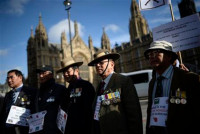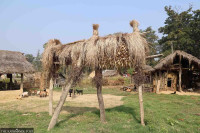National
High Court judge to lead transitional justice court
A three-member Transitional Justice Special Court, to be known simply as “Special Court”, has been proposed to look into incidents that occurred during the decade-long insurgency.
Dewan Rai
A three-member Transitional Justice Special Court, to be known simply as “Special Court”, has been proposed to look into incidents that occurred during the decade-long insurgency.
The judicial body will have one chairperson and two members, who will be appointed on the recommendation of the Judicial Council. The chief justice will have the final say in selecting all of them.
The chairperson will be picked from among the judges of High Courts. The two members will be appointed from among the legal professionals qualified to become the High Court judge.
The chairperson will have the same status as the chief judge of a High Court while members will be ranked equally as High Court judges.
According to a draft of the bill obtained by the Post, decisions on cases are made by all the three members. In cases of dissent, their majority will give the final verdict.
According to an official involved in drafting the legislation, the bill was prepared in line with the recommendations of the Judicial Council.
The JC had suggested a one-tier Special Court to deal with conflict-era cases while the government had proposed a two-tier court—trial court and appeal court—with three judges equally qualified as High Court judges in each level.
The new bill allows dissatisfied parties to file an appeal in the Supreme Court. The bill proposes a separate transitional justice bench, comprised of three justices, to look into the appeals.
The senior justice will head the bench. If a conflict victim is unsatisfied with a verdict of the Special Court, s/he can appeal in the apex court within 35 days.
In order to expedite hearing of transitional justice-related cases, the Special Court is bound to give its verdict in cases within three months of registration. As per the provision, the Truth and Reconciliation Commission and the Commission of Investigation on Enforced Disappeared Persons are supposed to recommend legal action through the attorney general, who will register the case in the Special Court.
As proposed, cases sub judice in the Special Court will be transferred to the High Court automatically if the tribunal is dissolved. However, the bill has not stipulated the tenure of the proposed court.
As per the proposed first amendment to the Enforced Disappearances Enquiry, Truth and Reconciliation Commission Act-2014, a maximum 20-year jail is being considered for the perpetrators of murder and disappearance. The draft also stipulates a 15-year jail term and Rs500,000 fine for those found guilty of rape. Those convicted of carrying out sexual assaults will be fined up to Rs200,000.
The draft bill also defines killings, enforced disappearance, rape and sexual abuse and torture as incidents of grave human rights violation. The transitional justice bodies should hand out punishment in two categories—general and serious.
The verdict of the Special Court will be final in general punishment but victims are allowed to appeal in the apex court in case of a “serious” penalty.
Ram Prasad Bhattarai, spokesperson for the Peace Ministry, said the bill would be further discussed and tabled in Parliament soon.




 13.16°C Kathmandu
13.16°C Kathmandu















